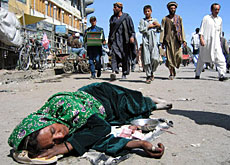Reconstruction tops agenda during Karzai visit

The president of Afghanistan, Hamid Karzai, was in Bern on Friday on an official visit aimed at strengthening ties between the two countries.
Discussions focused on rebuilding the country, where Swiss aid organisations have recently expressed concern over escalating violence.
Karzai met the 2003 Swiss president, Pascal Couchepin, and foreign minister Micheline Calmy-Rey.
At a press conference after the talks, Karzai said his country was grateful for the contribution Switzerland had made to Afghanistan and its people.
“Switzerland has been one of the countries that has consistently helped Afghanistan over the past 30 years,” Karzai said.
He added that Switzerland had also provided valuable political expertise in helping to prepare a new constitution for Afghanistan.
Last year, the Swiss government invested a total of SFr21 million in the country, and will match that figure during 2003.
Future directions
Friday’s meeting also included discussions on how Switzerland could continue to help Afghanistan.
“There are many other areas where Switzerland can continue to help,” Karzai said.
“Especially in the provision of scholarships, the energy sector and in the manufacture of medicine.”
Couchepin said no new promises of financial assistance had been made during the discussions, but confirmed that Switzerland would maintain existing levels of aid to Afghanistan in the future.
Karzai’s visit comes at a time of continuing violence in the Afghanistan, two years after United States-led forces overthrew the Taliban regime. He has threatened to resign unless the security situation improves.
There are increasing reports of violence against the United Nations International Security Assistance Force (ISAF), stationed in Kabul.
One of the most serious attacks came in early June, when four German soldiers were killed in a suicide car bomb attack in the capital.
Increasing violence
Karzai’s visit comes at a time of continuing violence in the Afghanistan, two years after United States-led forces overthrew the Taliban regime. He has threatened to resign unless the security situation improves.
There are increasing reports of violence against the United Nations International Security Assistance Force (ISAF), stationed in Kabul.
One of the most serious attacks came in early June, when four German soldiers were killed in a suicide car bomb attack in the capital.
Tension
Swiss security expert Albert Stahel believes the peacekeeping force’s reluctance to hand over power to Afghan forces is causing tension among the population, which in turn is provoking violence.
“If Washington’s policy does not change, the country will sink deeper step by step,” Stahel warned.
“But if the Afghans themselves have the opportunity to control the country, there is certainly a future.”
Aid agencies working in Afghanistan are also being targeted. In March, an aid worker with the International Committee of the Red Cross was shot dead by gunmen near the southern city of Kandahar.
There have also been grenade attacks against the offices of the United Nations and other organisations; demining crews have also been ambushed.
Aid agencies
Swiss non-governmental organisations stationed in Kabul say that while the peacekeeping force has managed to make the capital relatively safe, travelling outside the city can be dangerous.
“Overall, security has declined on a major scale,” Suzanne Schmeidl of the Swisspeace foundation, told swissinfo. “The north and the south in particular have become insecure.”
Karzai, however, said the security situation for aid agenices was better than media reports have suggested.
“The working environment is much better,” he said. “The police and army preparedness and the governmental information and reaction process is much better than what we had many months ago.”
“But if you ask us if we should improve on our efficiency, then yes, a lot has to be done.”
Women’s rights
Critics also argue there has been little progress in improving women’s rights since the fall of the Taliban, who imposed strict limitations on what they could do, say and wear.
According to Sima Samar, head of the country’s first independent human rights commission, faltering security in the country has brought new risks to their daily lives.
“There are more problems for women since the war started because a lack of security naturally restricts women more than it does men,” Samar told swissinfo.
While in Switzerland, Karzai also attended the Crans Montana Forum, which draws together political leaders, international organisations and representatives from the financial and industrial sectors to discuss global business issues.
swissinfo, Joanne Shields
United States-led forces invaded Afghanistan in October 2001, after the Taliban regime refused to hand over Saudi Arabian dissident Osama bin Laden.
Hamid Karzai was installed as the head of an interim, power-sharing government in December 2001.
In January 2002, the first contingent of international peacekeepers arrive in Afghanistan.
The United States has given Afghanistan over $2 billion (SFr2.7 billion) in aid since 2001.
The European Union has announced a €400 million (SFr615 million) reconstruction package spread over the next two years.

In compliance with the JTI standards
More: SWI swissinfo.ch certified by the Journalism Trust Initiative












You can find an overview of ongoing debates with our journalists here . Please join us!
If you want to start a conversation about a topic raised in this article or want to report factual errors, email us at english@swissinfo.ch.